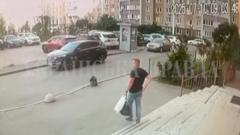**As Ukraine braces for a self-declared three-day ceasefire initiated by Russia, skepticism abounds among Ukrainians who perceive it as a mere facade.**
**Ukrainians Skeptical of Russia's Unilateral Ceasefire Proposal Amid Ongoing Conflict**

**Ukrainians Skeptical of Russia's Unilateral Ceasefire Proposal Amid Ongoing Conflict**
**Local sentiments reflect distrust towards Russian intentions as Zelensky dismisses the ceasefire offer as insincere.**
Russia is poised to implement a self-proclaimed three-day ceasefire beginning Wednesday night, aiming to coincide with the 80th anniversary of the conclusion of World War Two. However, this initiative is met with skepticism in Ukraine, where President Volodymyr Zelensky labelled it a "theatrical show."
Despite Russia's President Vladimir Putin's intent behind the ceasefire, the proposal has been dismissed in favor of a more significant 30-day ceasefire suggested by the Trump administration, which Ukraine has agreed to, but Russia has notably declined.
Ukrainians are exhibiting a profound distrust towards Russia, which is evident in polling, where around 95% of the population expressed skepticism about Russian motives. Tetyana Kondratenko, a shopkeeper from the heavily targeted Sumy region, voiced her disbelief in the likelihood of a genuine ceasefire, drawing attention to previous ceasefires that were exploited by Russian forces as tools for regrouping and launching further attacks.
April saw a notably brutal campaign with accusations of nearly 3,000 violations by Russia during a supposed ceasefire interval. Ukrainian officials remain ambiguous about possible military adjustments, with a presidential office source stating, "We'll see," when queried about operations during the proposed three-day span.
Mixed feelings abound among civilians, particularly in areas heavily impacted by warfare. Antonina Sienina, a resident of Zaporizhzhia whose family has been deeply affected, contemplates a potential respite from conflict, highlighting the dire need for moments of peace amidst the anxiety and stress of continual attacks.
Recent drone and missile strikes in Kyiv have perpetuated unrest, with casualties including a mother and her child. The Russian government claims its pause in fighting will continue unaffected, dismissing the impact of ongoing engagements.
Pavlo Klimkin, Ukraine's former foreign minister, characterized the ceasefire as a public relations move rather than a sincere call for peace. "This is all about Russia framing the agenda on its own terms," he stated, underscoring the disconnect between intentions and reality.
Ongoing negotiations toward a substantial ceasefire have been stagnant since February when the US intervened to mediate discussions, offering a longer ceasefire that has yet to be executed. Reports indicated civilian casualties rising dramatically, prompting a call for any potential ceasefire terms to prioritize human life.
Support exists for a temporary ceasefire, even at the cost of territorial concessions, among segments of the population, reflecting a deeper exhaustion from the protracted conflict. The director of the Kyiv International Institute of Sociology, Anton Grushetsky, mentioned a prevailing sense of fatigue among citizens, despite a commitment to maintaining national sovereignty.
The prevailing thought among many remains that the ceasefire could serve as a strategic maneuver for Russia, allowing troop repositioning and bolstering before launching new offensives. Mykhailo Samus, a military analyst, reflects this sentiment: "Why would we play Putin's game? We are ready for a real ceasefire."























